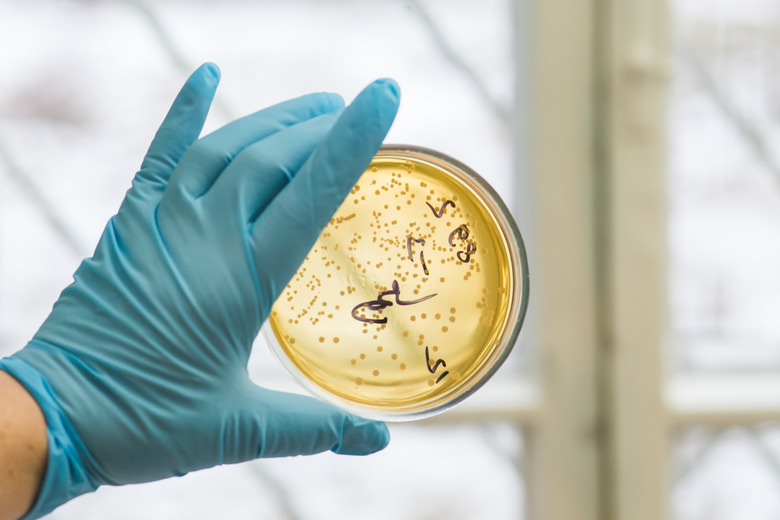Does Hydrogen Peroxide Kill Bacteria?
Hydrogen peroxide is widely used to treat cuts and scrapes, but some sources warn that it doesn't reliably kill all bacteria and can even harm healing tissue. The hydrogen peroxide molecule has one more oxygen atom than a water molecule, so it acts as an oxidizer. Some bacteria can defend themselves against this, and some can't. The chemical formula is written as H2O2, and the structural formula is H-O-O-H. For home use, it's sold as a 3-percent solution in water.
Hydrogen Peroxide as a Wound Cleaner
Hydrogen Peroxide as a Wound Cleaner
Hydrogen peroxide cleans wounds by moistening and loosening dried blood and any dirt or grit in the wound. It also helps the removal of dead tissue, which is called debridement. It foams on contact, and this effervescence helps to mechanically clean the wound, similar to fizzy denture cleaners. However, it can also destroy the cells called fibroblasts, which rebuild the connective tissue to heal the wound. For this reason, it is not recommended for long-term use.
Hydrogen Peroxide Has Limited Antibacterial Effects
Hydrogen Peroxide Has Limited Antibacterial Effects
Hydrogen peroxide is widely used as an antibacterial agent, but there are contrary opinions about its effectiveness. Certain types of aerobic bacteria, such as staphylococci, or "staph," have an enzyme called catalase, which breaks hydrogen peroxide down to water and oxygen, effectively diluting it. When hydrogen peroxide is foaming in a cut, some of that foam is oxygen liberated by the bacteria defending themselves. But some of the foam comes from destroyed fibroblasts, which also have catalase. A "catalase test" uses hydrogen peroxide to determine whether an unknown sample of bacteria is aerobic or anaerobic.
Hydrogen Peroxide Inhibits Bacterial Growth
Hydrogen Peroxide Inhibits Bacterial Growth
While hydrogen peroxide isn't always effective as antibacterial agent, it is a bacteriostatic agent, meaning it inhibits reproduction of bacteria. In so doing, it can help to avert worsening of infections without actually killing all of the bacteria. It can also kill fungal spores, making it a sporicide, and helps to prevent fungal infections. For these reasons, it's also used to disinfect surfaces such as cutting boards and counter tops.
Hydrogen Peroxide as an Oral Antiseptic
Hydrogen Peroxide as an Oral Antiseptic
Oral streptococci, also known as "strep," lack the enzyme catalase, and hydrogen peroxide is effective against them at a 1.7-percent solution – so a 3-percent solution from the bottle is diluted by about half. Its debridement action breaks down the cell walls, but it needs about 10 minutes to take effect. It's able to penetrate into periodontal areas between teeth and gums. There, its foaming action and release of oxygen changes the environment of anaerobic bacteria, inhibiting their growth. It also has the effect of whitening teeth by bleaching.
References
- Lenntech Water Treatment Solutions: Disinfectants Hydrogen peroxide
- WOUNDS: Antiseptics on Wounds: An Area of Controversy (PART TWO)
- Journal of Biological Chemistry: Hydrogen peroxide causes the fatal injury to human fibroblasts exposed to oxygen radicals.
- Journal of Applied Microbiology: The bactericidal, fungicidal and sporicidal properties of hydrogen peroxide and peracetic acid
- PubMed: Antibacterial activity of hydrogen peroxide and the lactoperoxidase-hydrogen peroxide-thiocyanate system against oral streptococci.
- Registered Dental Hygienist: Hydrogen peroxide in dentistry
Cite This Article
MLA
Silbajoris, Alex. "Does Hydrogen Peroxide Kill Bacteria?" sciencing.com, https://www.sciencing.com/hydrogen-peroxide-kill-bacteria-4606163/. 9 March 2018.
APA
Silbajoris, Alex. (2018, March 9). Does Hydrogen Peroxide Kill Bacteria?. sciencing.com. Retrieved from https://www.sciencing.com/hydrogen-peroxide-kill-bacteria-4606163/
Chicago
Silbajoris, Alex. Does Hydrogen Peroxide Kill Bacteria? last modified March 24, 2022. https://www.sciencing.com/hydrogen-peroxide-kill-bacteria-4606163/
